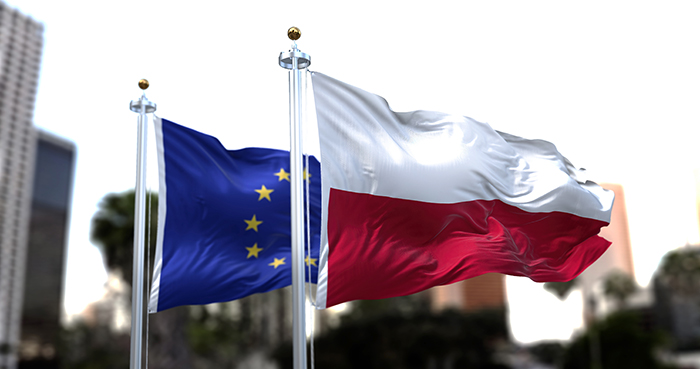Interviews / Europe, European Union, NATO
9 January 2025
Polish Presidency of the Council of the European Union: What Implications for Europe’s Defense?

Poland succeeded Hungary at the helm of the Presidency of the Council of the European Union on January 1st, for a period of six months. This mandate comes at a time when the war in Ukraine and the Russian threat persist, and the return of Donald Trump to the White House plunges Europe into uncertainty. Warsaw, which has been reconnecting with Brussels since the rise of Donald Tusk to power, aims to use this presidency as an opportunity to assert its positions on these issues at the continental level, particularly in matters of defense and security. What will be the main priorities of Poland’s Presidency of the EU Council? How have its relations with Brussels evolved since the 2021 crisis? Is Poland able to drive real leadership on the continent? Answers from Louise Souverbie, a researcher at IRIS, specializing in European defense issues and the arms industry.
Poland has just assumed the Presidency of the Council of the European Union, succeeding Hungary. What are the main strategic directions and defense priorities under this presidency?
The Polish presidency is centered around security, a theme that will be addressed in seven dimensions over the coming months: external, internal, economic, energy, health, food, and informational. In a deteriorating security environment and in the face of growing hybrid threats, Warsaw aims to contribute to strengthening the resilience and preparedness of the European Union (EU) through a holistic approach to security.
Regarding defense, efforts will focus particularly on continuing the strengthening of the defense industry and enhancing European military capabilities. The question of financing initiatives to achieve these objectives will thus be at the heart of the European debate during the Polish presidency. Warsaw supports European responsibility for defense through a significant increase in funds invested in this area, both at the member state level and within the EU. The Polish authorities are thus in favor of common European debt to support the revival of the European defense sector and the financing of joint projects in arms manufacturing, as well as the construction of military or dual-use infrastructures. Poland is particularly concerned with protecting the EU’s eastern border and is leading the East Shield project, a shield of infrastructures composed of military fortifications and technological systems (radars, anti-drone systems, etc.). Warsaw emphasizes the importance of this project for the entire Union and seeks to use EU instruments to support it.
Indeed, identifying a series of “projects of common interest for European defense” will be discussed within the framework of negotiations for the future European Defense Industry Program (EDIP). As the head of the Council, Poland will play a key role in discussions on this text proposed by the European Commission in March 2024. Since the Hungarian presidency failed to conclude discussions in the Council before the end of the year and transfer the text to Parliament, Poland is now taking over and will be tasked with finalizing the position of member states on this crucial issue for European defense.
How has the relationship between Poland and the European Union evolved, especially since the war in Ukraine?
The policies of the previous Polish government, led by Mateusz Morawiecki, and the Diet dominated by the Law and Justice Party (PiS) were marked by strong Euroscepticism and a challenge to the rule of law in Poland. This position logically strained relations between Brussels and Warsaw, leading to a suspension of post-Covid recovery and resilience funds to Poland, conditioned on implementing reforms to ensure judicial independence. However, Poland’s attachment to the EU – which is supported by the majority of the Polish population – and its position as the largest net beneficiary of the EU budget, have always limited the credibility of any potential “Polexit.”
Since February 24, 2022, when the PiS was still in power, Poland’s key role in supporting Ukraine has contributed to shifting the focus away from rule-of-law issues in relations between Warsaw and Brussels, even though Mateusz Morawiecki repeatedly denounced a “war on two fronts” and the stigmatization of Poland. In the fall of 2023, the electoral victory of the coalition led by Donald Tusk – former President of the European Council – marked a major shift in Warsaw’s position towards the EU.
Additionally, the European Commission is set to become a key player in the defense industry. This shift has been marked by the release of funding (currently limited) to support increased production capacity and joint arms acquisitions. Polish authorities have expressed interest in these initiatives, which also represent an opportunity for Poland’s defense industry to grow, in a context where this industry has now become a cornerstone of national security.
This recalibration of Poland’s position towards the European Commission and European defense initiatives has also manifested through a Polish-Greek initiative for a “European air defense shield.” The heads of government of both countries jointly sent a letter to the President of the European Commission – thus recognizing the new role of the European executive – calling for the development of this new capability based on the strengths of European industry, as well as the emergence of a “Defense Union.”
In what way is Poland able to assert its leadership within the European Union, especially in defense, given the fragility of traditional leaders like France and Germany?
Indeed, Warsaw has become a geographical and political center of gravity in the context of Russia’s aggression, a threat that countries on the eastern flank have always feared might resurface. As a hub of support for Ukraine and an emerging military power, Poland has quickly built credibility on which to base its leadership, already recognized in the Baltic region and along the eastern flank.
In 2024, Poland allocated 4.1% of its GDP to defense spending, and this figure could reach 4.7% in 2025, factoring in an extra-budgetary fund established in 2022, which is endowed with 8 to 12 billion euros annually. In 2025, Poland’s total defense spending could reach 41 billion euros, including 29 billion euros from the budget – compared to just under 13 billion in 2021 – gradually catching up with the leading European military powers. These investments aim to rapidly enhance Polish military capabilities through significant arms contracts with the United States, South Korea, and the United Kingdom.
With this new legitimacy and the return of a pro-European government to power, Warsaw now seeks to assert itself on the European stage and strengthen its influence within the EU (and NATO). The Presidency of the Council thus represents an opportunity to affirm this leadership as the EU prepares for the return of Donald Trump to the White House. In this context, Poland’s historical Atlantism could be an asset for relations with Washington, provided Warsaw and other European capitals do not succumb to the transactional approach desired by the new U.S. president, and the internal division in the EU that would ensue.

